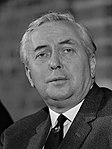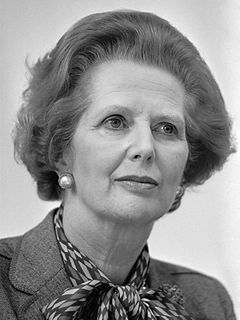| |||||||||||||||||||||||||||||||||||||||||||||||||
All 635 seats in the House of Commons 318 seats needed for a majority | |||||||||||||||||||||||||||||||||||||||||||||||||
|---|---|---|---|---|---|---|---|---|---|---|---|---|---|---|---|---|---|---|---|---|---|---|---|---|---|---|---|---|---|---|---|---|---|---|---|---|---|---|---|---|---|---|---|---|---|---|---|---|---|
| Turnout | 78.8%, | ||||||||||||||||||||||||||||||||||||||||||||||||
| |||||||||||||||||||||||||||||||||||||||||||||||||
 Colours denote the winning party—as shown in § Results | |||||||||||||||||||||||||||||||||||||||||||||||||
| |||||||||||||||||||||||||||||||||||||||||||||||||
The February 1974 United Kingdom general election was held on the 28th day of that month. Labour made large gains, but was short of a majority. Their leader Harold Wilson became Prime Minister after Conservative Edward Heath was unable to form a coalition. There was a hung parliament, as Conservatives won more votes but fewer seats. Labour won 301 seats, which was 17 seats short of an overall majority.

James Harold Wilson, Baron Wilson of Rievaulx, was a British Labour politician who served as Prime Minister of the United Kingdom from 1964 to 1970 and 1974 to 1976.

Sir Edward Richard George Heath, often known as Ted Heath, was a British politician who served as Prime Minister of the United Kingdom from 1970 to 1974 and Leader of the Conservative Party from 1965 to 1975. He was a strong supporter of the European Communities (EC), and after winning the decisive vote in the House of Commons by 336 to 244, he led the negotiations that culminated in Britain's entry into the EC on 1 January 1973. It was, says biographer John Campbell, "Heath's finest hour". Although he planned to be an innovator as Prime Minister, his government foundered on economic difficulties, including high inflation and major strikes. He became an embittered critic of Margaret Thatcher, who supplanted him as Tory leader.
A hung parliament is a term used in legislatures under the Westminster system to describe a situation in which no particular political party or pre-existing coalition has an absolute majority of legislators in a parliament or other legislature. This situation is also known, albeit less commonly, as a balanced parliament, or as a legislature under no overall control, and can result in a minority government. The term is not relevant in multi-party systems where it is rare for a single party to hold a majority.
Contents
- Campaign
- Conservative campaign
- Labour campaign
- Liberal campaign
- Position of the press
- Economic background
- Opinion polls
- Timeline
- Results
- Votes summary
- Seats summary
- Incumbents defeated
- Conservative
- Labour
- Liberal
- Scottish National Party
- Ulster Unionist Party
- Unionist Party of Northern Ireland
- Unity
- Independent Socialist
- See also
- Notes
- References
- Sources
- Further reading
- External links
- Manifestos
This election saw Northern Ireland diverging heavily from the rest of the United Kingdom, with all twelve MPs elected being from local parties (eleven of them representing unionist parties), following the decision of the Ulster Unionists to withdraw support from the Conservative Party in protest over the Sunningdale Agreement. The Scottish National Party achieved significant success in this election. They increased their share of the popular vote in Scotland from 11% to 22% and their number of MPs rose from 1 to 7. There were also the first Plaid Cymru MPs to be elected in a general election in Wales (they had previously won a by-election).

Northern Ireland is a part of the United Kingdom in the north-east of the island of Ireland, variously described as a country, province or region. Northern Ireland shares a border to the south and west with the Republic of Ireland. In 2011, its population was 1,810,863, constituting about 30% of the island's total population and about 3% of the UK's population. Established by the Northern Ireland Act 1998 as part of the Good Friday Agreement, the Northern Ireland Assembly holds responsibility for a range of devolved policy matters, while other areas are reserved for the British government. Northern Ireland co-operates with the Republic of Ireland in some areas, and the Agreement granted the Republic the ability to "put forward views and proposals" with "determined efforts to resolve disagreements between the two governments".
The Sunningdale Agreement was an attempt to establish a power-sharing Northern Ireland Executive and a cross-border Council of Ireland. The Agreement was signed at Sunningdale Park located in Sunningdale, Berkshire, on 9 December 1973. Unionist opposition, violence and a loyalist general strike caused the collapse of the Agreement in May 1974.
The Scottish National Party is a Scottish nationalist and social-democratic political party in Scotland. The SNP supports and campaigns for Scottish independence. It is the second-largest political party by membership in the United Kingdom, behind the Labour Party and ahead of the Conservative Party, it is the third-largest by overall representation in the House of Commons, behind the Conservative Party and the Labour Party, and it is the largest political party in Scotland, where it has the most seats in the Scottish Parliament and 35 out of the 59 Scottish seats in the House of Commons of the Parliament of the United Kingdom. The current Scottish National Party leader, Nicola Sturgeon, has served as First Minister of Scotland since November 2014.
Although the incumbent Conservative government of Edward Heath polled the most votes by a small margin, the Conservatives were overtaken in terms of seats by Harold Wilson's Labour Party due to a more efficiently-distributed Labour vote, and the decision by Ulster Unionist MPs not to take the Conservative whip.
A whip is an official of a political party whose task is to ensure party discipline in a legislature. This usually means ensuring that members of the party vote according to the party platform, rather than according to their own individual ideology or the will of their constituents.
The two largest parties both lost a considerable share of the popular vote, largely to the Liberals under Jeremy Thorpe who polled two and a half times the share of the national vote that they had achieved in the previous election. But even with over six million votes, only 14 Liberal MPs were elected. There had been some media expectation that the Liberals could take twice as many seats. [1]

The Liberal Party was one of the two major parties in the United Kingdom with the opposing Conservative Party in the 19th and early 20th centuries. The party arose from an alliance of Whigs and free trade Peelites and Radicals favourable to the ideals of the American and French Revolutions in the 1850s. By the end of the 19th century, it had formed four governments under William Gladstone. Despite being divided over the issue of Irish Home Rule, the party returned to government in 1905 and then won a landslide victory in the following year's general election.

John Jeremy Thorpe was a British politician who served as Liberal Member of Parliament for North Devon from 1959 to 1979, and as leader of the Liberal Party between 1967 and 1976. In May 1979 he was tried at the Old Bailey on charges of conspiracy and incitement to murder, arising from an earlier relationship with Norman Scott, a former model. Thorpe was acquitted on all charges, but the case, and the furore surrounding it, ended his political career.
Heath did not resign immediately as Prime Minister. Assuming that Northern Ireland's Unionist MPs could be persuaded to support a Conservative government on confidence matters over one led by Wilson, he entered into negotiations with Thorpe to form a coalition government. Thorpe, never enthusiastic about supporting the Conservatives, demanded major electoral reforms in exchange for such an agreement. Unwilling to accept such terms, Heath resigned and Wilson returned for his second stint as Prime Minister of the United Kingdom.
A coalition government is a cabinet of a parliamentary government in which multiple political parties cooperate, reducing the dominance of any one party within that "coalition". The usual reason for this arrangement is that no party on its own can achieve a majority in the parliament. A coalition government might also be created in a time of national difficulty or crisis to give a government the high degree of perceived political legitimacy or collective identity it desires while also playing a role in diminishing internal political strife. In such times, parties have formed all-party coalitions. If a coalition collapses, a confidence vote is held or a motion of no confidence is taken.

The Prime Minister of the United Kingdom is the head of government of the United Kingdom. The Prime Minister directs both the executive and the legislature, and together with their Cabinet are collectively accountable for their policies and actions to the Monarch, to Parliament, to their political party and ultimately to the electorate. The office of Prime Minister is one of the Great Offices of State. The current holder of the office, Theresa May, leader of the Conservative Party, was appointed by the Queen on 13 July 2016.
Labour did not have enough seats to combine with another party to achieve an overall majority. This made the formation of a stable government in this Parliament a practical impossibility. Wilson was widely expected from the outset to call another general election before long, and this happened in October that year.
The election night was covered live on the BBC, and was presented by Alastair Burnet, David Butler, Robert McKenzie and Robin Day. [1] [2]
Prominent members of Parliament who retired or were defeated at this election included Gordon Campbell, Bernadette McAliskey, Enoch Powell, Richard Crossman, Tom Driberg and Patrick Gordon Walker. It was the first of two United Kingdom general elections held that year, the first election to take place after the United Kingdom became a member of the European Communities on 1 January 1973 and also the first election since the Second World War not to produce an overall majority in the House of Commons for the winning party.

















